Our research explores how immune cells communicate with each other and how they recognise and detect signs of disease.
Our lab is led by Professor Dan Davis. We specialise in:
- Using state of the art microscopy to compare how the organisation of receptors on the surfaces of immune cells vary in health and disease.
- Understanding how different aspects of immune cell effector function could be manipulated in the next generation of immunotherapies.
Our research
Understanding the immune system is one of the most important scientific frontiers of the 21st century.
Our immune system helps protect the body from any number of disease-causing pathogens as well as from the development of cancer. Immune cell manipulation can lead to new treatments and a greater knowledge as to how these cells operate in the body.
Our work allows us to better understand:
- how our immune systems work and ways in which medicines can regulate immunity;
- different methods to boost immune responses against cancer;
- mechanisms to repress immune activity in auto-immune diseases;
- signal integration, cellular activation and the secretion of cytokines and lytic granules;
- how viruses spread between cells.
Our approach
We study immune cell recognition using a combination of molecular and cellular biology methods, and cutting-edge super-resolution microscopy techniques, including:
- stochastic optical reconstruction microscopy (STORM)
- photoactivation localization microscopy (PALM)
- stimulated emission depletion (STED).
Our current work
We are now comparing how the surface organisation of immune cells – natural killer (NK) cells, T cells and macrophages – vary in health and disease, as well as in individuals with variations in immune system genes.
We aim to test how the structure of cell surfaces impacts the thresholds at which immune responses are turned on and off.
Our discoveries
Our lab team has:
- Revealed the specific rearrangements in F-actin during immune synapse assembly and how receptor organisation in this structure is altered upon cellular activation.
- Probed functions and mechanisms of such synapse formation, more recently using super-resolution microscopy to provide a nanoscale understanding of this.
- Co-discovered membrane nanotubes, thin strands of membrane that keep immune cells connected over long distances, and identified their role in facilitating the spread of HIV-1 between cells.
Professor Davis worked as a postdoctoral researcher with Jack Strominger, Higgins Professor of Biochemistry at Harvard University. Here he was the first to describe a natural killer (NK) cell immune synapse.
Publications
View our publications on Dan Davis’ Research Explorer profile.
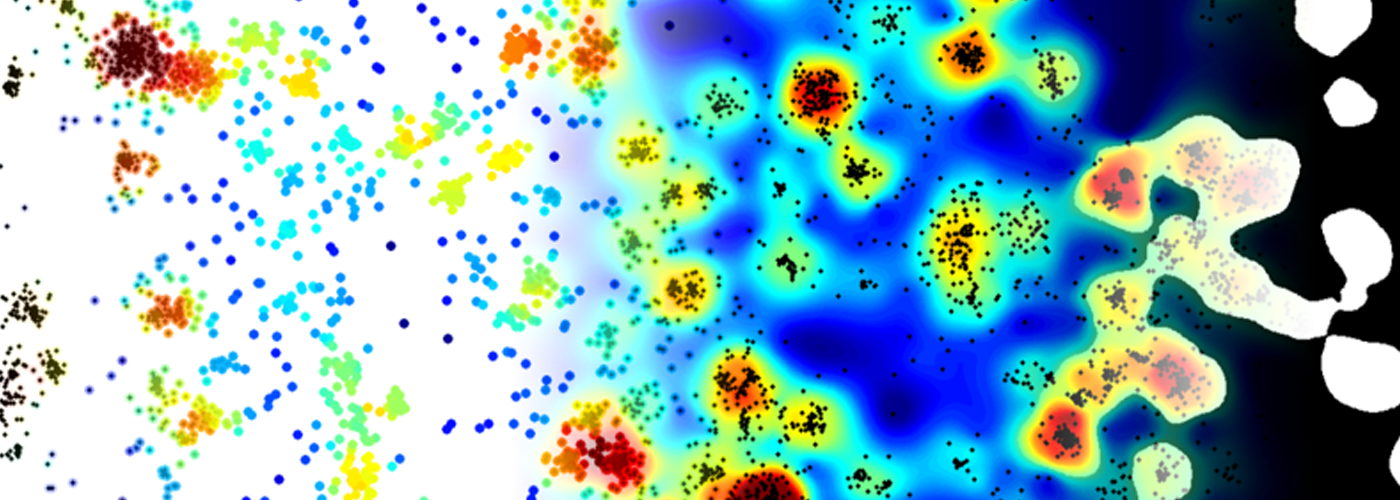
Books
Professor Dan Davis has published bestselling books which delve into human genetics and our body’s immunity to disease. These titles are available to buy now.
The Compatibility Gene (2014)
Professor Davis explains how crucial genes define our relationships, our health and our individuality. A tiny, distinctive cluster of our genes plays a disproportionately large part in how our bodies work.
These few genes, argues Davis, define who we are as individuals and our relationship to the world: how we combat disease, how our brains are wired, how attractive we are, and even how likely we are to reproduce.
Order this book
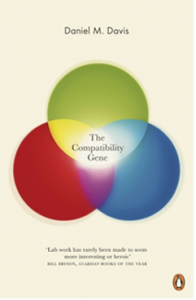
The Beautiful Cure (2018)
Our immune system is one of the great marvels of nature and it holds the key to human health.
Professor Davis charts the ground-breaking scientific quest to understand how it fights disease, enables the body to heal itself and responds to stress, sleep, age and our state of mind.
Order this book

The Secret Body (2021)
Recent and dramatic breakthroughs in our understanding of the body will profoundly change the experience of being human in the coming century.
The Secret Body shows how these radical and disconcerting possibilities have been made real thanks to the ingenious technologies and decades-long collaborations of scientists worldwide. A gripping drama of discovery and a landmark account of this dawning revolution, it presents a vision of the human body of dizzying complexity, wonder and possibility.
Order this book
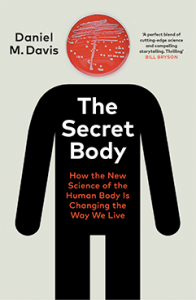
PhDs and early career research
The Davis Lab offers excellent opportunities for PhD students and early career researchers.
Launch your research career
Since 2000, more than 40 members of our lab have gone on to successful research careers at prestigious research institutions in the UK, Europe and USA, such as the University of Cambridge, Imperial College London and Cancer Research UK.
All PhD students have progressed into postdoctoral research roles, and our postdoctoral researchers have gone on to a wide range of positions including lecturer, clinical trials manager and lab manager.
Opportunities in our lab
For PhD projects and early career research roles within the Davis Lab, see the Opportunities section of Dan’s research profile.
Our team
Head of lab
Dan Davis – Professor of Immunology
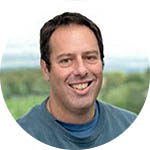 Dan helped pioneer the use of microscopy to show how immune cells communicate with each other and detect disease in other cells, and he co-discovered the natural killer cell immune synapse and membrane nanotubes.
Dan helped pioneer the use of microscopy to show how immune cells communicate with each other and detect disease in other cells, and he co-discovered the natural killer cell immune synapse and membrane nanotubes.
He wrote The Compatibility Gene and The Beautiful Cure, which was a Book of The Year in the Times, The Telegraph and New Scientist, and has been translated into over 15 languages.
View Dan’s research profile.
Ashley Ambrose – Postdoctoral research associate
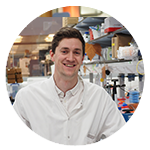 Ashley studied for a BSc in Biomedical Science and MSc in Molecular Medicine at the University of Sheffield and then completed a PhD in Cardiovascular Science at the University of Leicester.
Ashley studied for a BSc in Biomedical Science and MSc in Molecular Medicine at the University of Sheffield and then completed a PhD in Cardiovascular Science at the University of Leicester.
He is currently investigating the secretion of proteins and extracellular vesicles from NK cells and macrophages using an array of microscopy techniques.
Susanne Dechantsreiter – PhD student
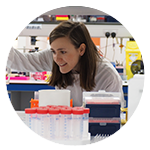 Susanne studied chemistry in Germany, Australia and France and she is currently investigating the nano-dynamics of receptor molecules in the membrane of lung and blood-derived macrophages. She also studies the secretion of vesicles by macrophages.
Susanne studied chemistry in Germany, Australia and France and she is currently investigating the nano-dynamics of receptor molecules in the membrane of lung and blood-derived macrophages. She also studies the secretion of vesicles by macrophages.
Roseanna Hare – PhD student
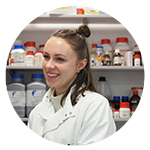 Roseanna graduated with an integrated master’s degree in Biochemistry from the University of Sheffield in 2017, having spent a year working for AstraZeneca in Sweden.
Roseanna graduated with an integrated master’s degree in Biochemistry from the University of Sheffield in 2017, having spent a year working for AstraZeneca in Sweden.
Prior to starting her PhD, she worked in the publishing department for the Nature journals. She is currently investigating the nanoscale organisation of therapeutically relevant inhibitory receptors in NK cells.
Khodor Hazime – Postdoctoral research associate
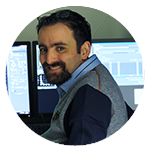 Khodor holds a master’s degree from the University of Leicester in Chronic Diseases and Inflammation and a PhD in Biomedical Science from the University of Sheffield. He is currently working on the nanoscale organisation of activating receptors on NK cells at Dan Davis’s lab.
Khodor holds a master’s degree from the University of Leicester in Chronic Diseases and Inflammation and a PhD in Biomedical Science from the University of Sheffield. He is currently working on the nanoscale organisation of activating receptors on NK cells at Dan Davis’s lab.
Alexandros Karampatzakis – PhD student
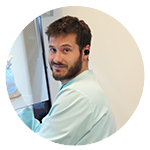 During his bachelor’s degree, Alexandros studied at the University of Thessaly in Larissa in the department of Biochemistry and Biotechnology.
During his bachelor’s degree, Alexandros studied at the University of Thessaly in Larissa in the department of Biochemistry and Biotechnology.
At the University of Uppsala, he then did my master’s in Medical Research with a focus on molecular medicine. Currently, he is a PhD student in Professor Dan Davis' lab, investigating the response of NK cells to variable mAbs therapies.
Ines Diaz del Olmo – PhD student
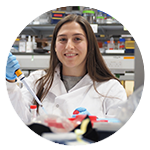 Ines graduated from Alcala de Henares University with a BSc in Health Biology in 2015, with a year at the VIB centre in Brussels where she studied nanobodies.
Ines graduated from Alcala de Henares University with a BSc in Health Biology in 2015, with a year at the VIB centre in Brussels where she studied nanobodies.
In 2016 she completed an MRes in Microbiology from Autonomous University of Madrid. She is currently investigating the crosstalk between the complement system and the inflammasome in macrophages.
Chloe Patterson – PhD student
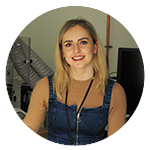 Chloe graduated from the University of Leeds in 2019 with a BSc in Medical Sciences, including a one year industrial placement within the Immuno-Oncology group at Kymab Ltd in Cambridge.
Chloe graduated from the University of Leeds in 2019 with a BSc in Medical Sciences, including a one year industrial placement within the Immuno-Oncology group at Kymab Ltd in Cambridge.
Her CRUK-funded research investigates the effects of cyclooxygenase-2-mediated inflammation on the anti-tumour immune response, primarily focusing on NK cells.
Camille Rey – Postdoctoral research associate
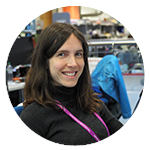 Camille studied Pharmacy at Paris XI University and did a PhD in Cellular Microbiology at Institut Pasteur (affiliated to Paris 7 University).
Camille studied Pharmacy at Paris XI University and did a PhD in Cellular Microbiology at Institut Pasteur (affiliated to Paris 7 University).
Email: camille.rey@manchester.ac.uk
Poppy Simmonds – PhD student
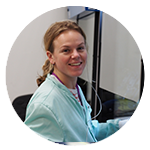 Poppy studied Biological Sciences at the University of Oxford followed by an MRes in Cancer Informatics at Imperial College, and a stint in manufacturing with Professor Mark Lowdell at the Royal Free Hospital.
Poppy studied Biological Sciences at the University of Oxford followed by an MRes in Cancer Informatics at Imperial College, and a stint in manufacturing with Professor Mark Lowdell at the Royal Free Hospital.
She is currently funded by the MRC to study NK cell mechanosensing of target cells, and human lung NK cell responses.
Karoliina Tuomela – PhD student
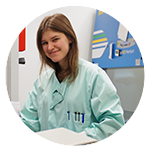 Karoliina graduated from the University of Aberdeen with a BSc in Biomedical Sciences (Pharmacology) and then completed an MRes in Oncology at the University of Manchester studying the effect of radiotherapy-immunotherapy combinations on anti-tumour immunity.
Karoliina graduated from the University of Aberdeen with a BSc in Biomedical Sciences (Pharmacology) and then completed an MRes in Oncology at the University of Manchester studying the effect of radiotherapy-immunotherapy combinations on anti-tumour immunity.
She is currently investigating how NK cell responses are affected by the treatment of cancer cells with radiotherapy.
Kevin Stacey – Lab manager and research technician
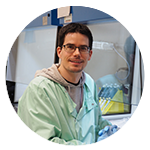 Kevin graduated from Dublin City University with a BSc in Chemical and Pharmaceutical Sciences in 2006 and an MSc from Maynooth University in Immunology and Global Health in 2007.
Kevin graduated from Dublin City University with a BSc in Chemical and Pharmaceutical Sciences in 2006 and an MSc from Maynooth University in Immunology and Global Health in 2007.
In 2011 he obtained a PhD in Molecular Immunology from the Royal College of Sciences in Ireland.
Jonathan Worboys – Postdoctoral research associate
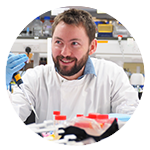 Jonathan graduated from Imperial College London with a BSc in Biology, with a year in Europe in 2010.
Jonathan graduated from Imperial College London with a BSc in Biology, with a year in Europe in 2010.
In 2015 he completed a PhD in Cancer Biology from the Institute of Cancer Research in London. He completed a postdoc with Dr Gloria Lopez-Castejon in 2018, working on molecular aspects of inflammasome signalling before joining the Davis lab.
Life in the lab
As part of our international team, you’ll have regular opportunities to get involved in social events and public engagement activities.
Read our blog to find out what’s been happening in our lab recently.
Contact us
If you have any questions, please get in touch.
Professor Dan Davis – Head of lab
Telephone: +44 (0)161 275 5019
Email: daniel.davis@manchester.ac.uk
Kevin Stacey – Lab manager
Email: kevin.stacey@manchester.ac.uk
Our address
The Davis Lab
Core Technology Facility
46 Grafton Street
The University of Manchester
Manchester
M13 9NT
